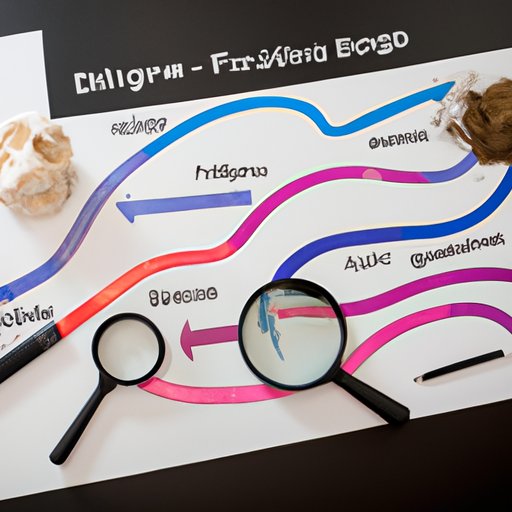Introduction
Forensic science is the application of scientific principles and techniques to matters of criminal justice. It involves the use of sophisticated methods and technology to investigate crime scenes and collect evidence. Forensic scientists are highly trained professionals who work with law enforcement and other agencies to identify, analyze, and interpret physical and digital evidence related to criminal activities. For those interested in pursuing a career in this field, it’s important to understand the different degree paths available.

Exploring Different Degree Paths in Forensic Science
The type of degree you pursue will depend on your career goals and professional experience. Generally speaking, there are three main types of degree programs available in forensic science: bachelor’s degrees, master’s degrees, and doctoral degrees. Each type of degree has its own set of requirements, benefits, and drawbacks.
Bachelor’s Degrees
A bachelor’s degree in forensic science can provide the foundation you need to enter the field. This type of degree typically takes four years to complete and includes courses in criminal justice, chemistry, biology, and physics. Bachelor’s degree programs also offer classes in areas such as legal studies, psychology, and computer science that are relevant to the field. Students learn how to apply their knowledge to real-world situations and gain practical skills through hands-on lab work.
Master’s Degrees
A master’s degree in forensic science can be a great way to advance your career. This type of degree typically takes two years to complete and focuses on more specialized topics such as toxicology, pathology, and DNA analysis. Master’s degree programs often require students to complete an internship or research project in order to gain practical experience and hone their skills. Additionally, many programs offer electives that allow students to customize their degree to fit their specific interests and career goals.
Doctoral Degrees
A doctoral degree in forensic science is the highest level of education available in the field. This type of degree typically takes four to five years to complete and requires extensive coursework and research. Doctoral degree programs focus on advanced topics such as biochemistry, statistics, and genetics. They also require students to complete a dissertation, which demonstrates their ability to think critically and solve complex problems. Doctoral degree holders are typically qualified to teach at the college level or take on leadership roles in the field.
A Guide to Selecting the Right Degree Program for Forensic Science
When deciding which degree path to pursue, it’s important to assess your options and understand your educational requirements. Here are some tips to help you make the right choice:
Assessing Your Options
When choosing a degree program, it’s important to consider your career goals and professional experience. If you’re just starting out in the field, a bachelor’s degree may be the best option. However, if you already have some experience in forensic science and want to move up in the field, a master’s or doctoral degree may be more appropriate.
Understanding Your Educational Requirements
It’s also important to understand the educational requirements for each type of degree. Bachelor’s degree programs typically require four years of study, while master’s and doctoral degree programs usually take two to five years to complete. In addition to coursework, many degree programs require students to complete internships and research projects.
Deciding on a Degree Program
Once you’ve assessed your options and understand the educational requirements, it’s time to decide on a degree program. Consider your career goals, budget, and lifestyle when making your decision. Talk to advisors, employers, and other professionals in the field to get their advice and perspective. Ultimately, the right degree program should provide you with the skills and knowledge you need to succeed in the field.
What Education Do You Need to Become a Forensic Scientist?
In addition to a degree in forensic science, there are other educational requirements you must meet in order to become a forensic scientist. These include coursework requirements, professional experience requirements, and licensing requirements.
Coursework Requirements
Most states require that forensic scientists have a minimum of a bachelor’s degree in forensic science or a related field. Depending on the state, additional coursework in areas such as criminal justice, biology, chemistry, and physics may be required. Many states also require that forensic scientists have completed an internship or other type of professional experience.
Professional Experience Requirements
Many states require that aspiring forensic scientists have professional experience in the field before they can become certified. This may include completing an internship or other type of supervised training program. In some cases, this experience may be completed while working towards a degree in forensic science.
Licensing Requirements
In addition to educational requirements, most states require that forensic scientists be licensed in order to practice. Licensure typically involves passing a written exam and meeting other requirements such as completing continuing education courses and participating in professional organizations.
Which Degree Should You Pursue for a Career in Forensic Science?
When deciding which degree to pursue for a career in forensic science, there are several factors to consider. The type of degree you choose will depend on your career goals, professional experience, and educational requirements. Here are some pros and cons of each type of degree:
Factors to Consider
When choosing a degree program, you should consider your career goals, budget, and lifestyle. If you’re just starting out in the field, a bachelor’s degree may be the best option. However, if you already have some experience in forensic science and want to move up in the field, a master’s or doctoral degree may be more appropriate.
Pros and Cons of Different Degree Paths
Each type of degree has its own set of benefits and drawbacks. Bachelor’s degree programs provide a strong foundation in the field and are typically less expensive than other types of degree programs. Master’s and doctoral degree programs offer more specialized knowledge and the opportunity to pursue research and teaching positions. However, these programs are more time consuming and expensive.
Assessing Your Options: Bachelor’s, Master’s and Doctoral Degrees in Forensic Science
Now that you’ve assessed your options and weighed the pros and cons of each type of degree program, it’s time to decide which one is right for you. Here’s an overview of the different degree paths in forensic science:
Benefits of Pursuing a Bachelor’s Degree
A bachelor’s degree in forensic science provides the foundational knowledge and skills needed to enter the field. This type of degree typically takes four years to complete and includes courses in criminal justice, chemistry, biology, and physics. Bachelor’s degree programs also offer classes in areas such as legal studies, psychology, and computer science that are relevant to the field. Students learn how to apply their knowledge to real-world situations and gain practical skills through hands-on lab work.
Benefits of Pursuing a Master’s Degree
A master’s degree in forensic science can be a great way to advance your career. This type of degree typically takes two years to complete and focuses on more specialized topics such as toxicology, pathology, and DNA analysis. Master’s degree programs often require students to complete an internship or research project in order to gain practical experience and hone their skills. Additionally, many programs offer electives that allow students to customize their degree to fit their specific interests and career goals.
Benefits of Pursuing a Doctoral Degree
A doctoral degree in forensic science is the highest level of education available in the field. This type of degree typically takes four to five years to complete and requires extensive coursework and research. Doctoral degree programs focus on advanced topics such as biochemistry, statistics, and genetics. They also require students to complete a dissertation, which demonstrates their ability to think critically and solve complex problems. Doctoral degree holders are typically qualified to teach at the college level or take on leadership roles in the field.

An Overview of Undergraduate and Graduate Degrees in Forensic Science
Now that you’ve assessed your options and understand the educational requirements, it’s time to decide on a degree program. Here’s an overview of the different types of degree programs in forensic science:
Overview of Bachelor’s Degree Programs
Bachelor’s degree programs in forensic science typically take four years to complete and include courses in criminal justice, chemistry, biology, and physics. Students also learn about legal studies, psychology, and computer science. Additionally, many programs offer hands-on lab experiences and internships.
Overview of Master’s Degree Programs
Master’s degree programs in forensic science typically take two years to complete and focus on more specialized topics such as toxicology, pathology, and DNA analysis. Many programs require students to complete an internship or research project in order to gain practical experience. Additionally, many programs offer electives that allow students to customize their degree to fit their specific interests and career goals.
Overview of Doctoral Degree Programs
Doctoral degree programs in forensic science typically take four to five years to complete and require extensive coursework and research. Doctoral degree programs focus on advanced topics such as biochemistry, statistics, and genetics. They also require students to complete a dissertation, which demonstrates their ability to think critically and solve complex problems. Doctoral degree holders are typically qualified to teach at the college level or take on leadership roles in the field.

Choosing the Right Degree for a Career in Forensic Science
When deciding which degree to pursue for a career in forensic science, it’s important to evaluate your goals, weigh your options, and make the right choice. Here are some tips to help you make the best decision:
Evaluating Your Goals
When choosing a degree program, it’s important to consider your career goals and professional experience. If you’re just starting out in the field, a bachelor’s degree may be the best option. However, if you already have some experience in forensic science and want to move up in the field, a master’s or doctoral degree may be more appropriate.
Weighing Your Options
It’s also important to understand the educational requirements for each type of degree. Bachelor’s degree programs typically require four years of study, while master’s and doctoral degree programs usually take two to five years to complete. In addition to coursework, many degree programs require students to complete internships and research projects.
Making the Right Choice
Once you’ve assessed your options and understand the educational requirements, it’s time to decide on a degree program. Consider your career goals, budget, and lifestyle when making your decision. Talk to advisors, employers, and other professionals in the field to get their advice and perspective. Ultimately, the right degree program should provide you with the skills and knowledge you need to succeed in the field.
Conclusion
Choosing the right degree program for a career in forensic science can be a daunting task. It’s important to assess your options, understand your educational requirements, and weigh the pros and cons of each type of degree. With the right information and guidance, you can make the right decision and find the degree program that is right for you.
(Note: Is this article not meeting your expectations? Do you have knowledge or insights to share? Unlock new opportunities and expand your reach by joining our authors team. Click Registration to join us and share your expertise with our readers.)
